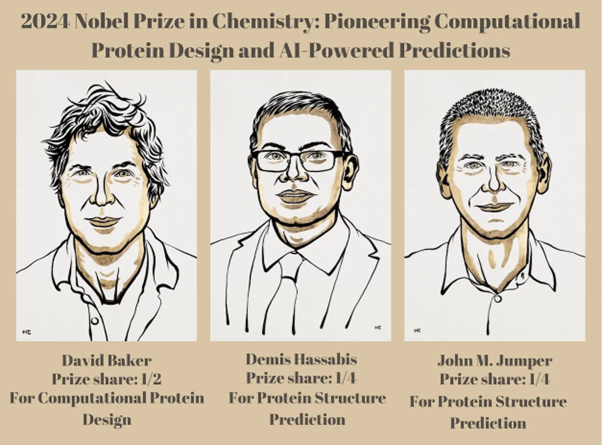Introduction
The Nobel Prize in Chemistry 2024 has been awarded to David Baker, along with Demis Hassabis and John M. Jumper, for their groundbreaking contributions to the field of computational protein design. This recognition highlights the significant advancements in understanding protein structures and functions, which have profound implications for various scientific fields, including medicine, biotechnology, and environmental science.
Overview of the Laureates

David Baker
-
- Background: David Baker is a prominent scientist known for his pioneering work in computational biology and protein design. He is a professor at the University of Washington and the director of the Institute for Protein Design.
- Contributions: Baker’s research focuses on using computational methods to predict and design novel protein structures. His work has led to the development of software tools that enable scientists to create proteins with specific functions, paving the way for advancements in drug development and synthetic biology.
Demis Hassabis
-
- Background: Demis Hassabis is a co-founder of DeepMind, a leading artificial intelligence research company. He has a background in neuroscience and computer science.
- Contributions: Hassabis’s work at DeepMind has involved applying AI techniques to complex biological problems, including protein folding. His contributions have enhanced our understanding of how proteins fold into their functional forms, which is crucial for developing new therapeutics.
John M. Jumper
-
- Background: John Jumper is a researcher at DeepMind who has played a key role in developing AI models for predicting protein structures.
- Contributions: Jumper was instrumental in creating AlphaFold, an AI system that predicts protein folding with remarkable accuracy. This tool has revolutionized structural biology by providing insights into protein structures that were previously difficult to determine experimentally.
The Significance of Computational Protein Design
Understanding Proteins
Proteins are essential macromolecules that perform a vast array of functions within living organisms. They are composed of long chains of amino acids, and their specific three-dimensional structures determine their functionality. Understanding how proteins fold and interact is crucial for numerous applications, including:
-
- Drug Development: Designing new drugs requires knowledge of protein structures to identify potential targets for therapeutic intervention.
- Synthetic Biology: Engineers can create novel proteins with tailored functions for applications such as biofuels, bioremediation, and industrial processes.
Advances in Computational Methods
The laureates’ work has significantly advanced computational methods used in protein design:
1. AlphaFold: Developed by DeepMind, AlphaFold uses deep learning techniques to predict protein structures from amino acid sequences. It has achieved unprecedented accuracy in predicting how proteins fold, surpassing traditional methods that relied on experimental data. AlphaFold’s predictions have been made publicly available, providing researchers worldwide with valuable insights into protein structures.
2. Rosetta Software Suite: Developed by David Baker’s lab, Rosetta is a comprehensive software suite used for modeling protein structures and designing new proteins. It allows researchers to simulate how proteins will fold and interact, facilitating the design of proteins with desired properties.
3. Machine Learning Applications: The integration of machine learning into computational biology has accelerated the discovery process by enabling rapid analysis of large datasets related to protein sequences and structures.
Implications for Science and Medicine
The advancements in computational protein design have far-reaching implications:
1. Targeted Drug Discovery: By understanding protein structures more accurately, researchers can develop targeted therapies for diseases such as cancer, Alzheimer’s disease, and infectious diseases.
2. Vaccine Development: Insights into protein folding can aid in designing more effective vaccines by identifying key epitopes that elicit strong immune responses.
3. Biotechnology Innovations: The ability to design custom proteins opens new avenues for creating enzymes that can catalyze specific reactions in industrial processes or produce biofuels more efficiently.
4. Environmental Applications: Engineered proteins can be developed for bioremediation efforts, helping to break down pollutants or enhance carbon capture technologies.
Conclusion
The Nobel Prize in Chemistry 2024 awarded to David Baker, Demis Hassabis, and John M. Jumper recognizes their transformative contributions to the field of computational protein design. Their work not only advances our understanding of fundamental biological processes but also paves the way for innovative applications across medicine, biotechnology, and environmental science.
As we continue to explore the complexities of life at the molecular level, the insights gained from these pioneering efforts will undoubtedly lead to new discoveries and solutions that benefit society as a whole. The recognition of these laureates highlights the importance of interdisciplinary collaboration between computational sciences and traditional biology in addressing some of humanity’s most pressing challenges.
Spread the Word



